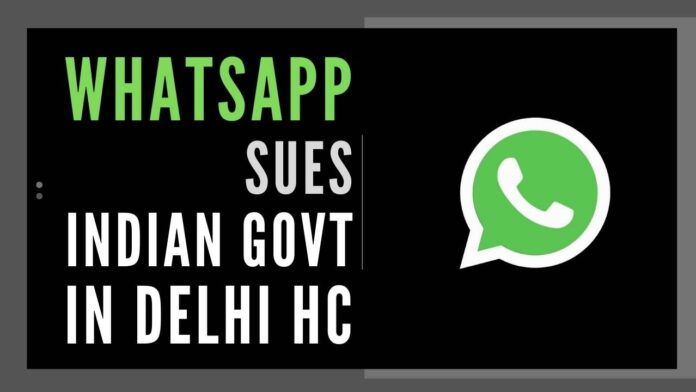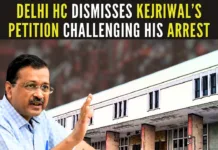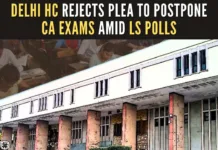
Facebook-owned WhatsApp challenged the Government of India’s new IT Rules in Delhi High Court saying that tracing the originator of fake news and objectionable messages is against the right to privacy of individuals and their fundamental right to freedom of speech and expressions. Tracing the messages to find the originator as per the Rule 4(2) of the Information Technology (Intermediary Guidelines and Digital Media Ethics Code) Rules, 2021 is totally unreasonable against the rights given to citizens by the Indian Constitution, said WhatsApp in their petition, adding that the new rules are against the company’s end-to-end encrypted platform.
Interestingly former Telecom IT Minister and noted lawyer Kapil Sibal represent Facebook and WhatsApp now in courts. Sibal and noted Arvind Datar are expected to argue for WhatsApp in this case also against the Government of India. Responding to the petition, IT Minister Ravi Shankar Prasad on Wednesday said that these provisions are meant for serious crimes only and these provisions are needed for investigative agencies to find the real culprits[1].
WhatsApp also pointed out that that the Rule violates Sections 69A and 79(2) of the Information Technology Act, which defines the scope of the Centre’s authority.
In the petition, WhatsApp apprehended that such a system could put journalists at risk of retaliation for investigating issues that may be unpopular. Moreover, civil or political activists could face the heat of discussing certain rights and criticizing or advocating for politicians or policies. Clients and attorneys could become reluctant to share confidential information for fear that the privacy and security of their communications are no longer ensured, WhatsApp has said.
“With end-to-end encryption, users feel safe to communicate freely…Once citizens become aware that SSMIs have built the ability to identify the first originator of information in India on their end-to-end encrypted messaging services, individuals will not feel safe to speak freely for fear that their lawful private communications will be used against them, thereby infringing their rights to privacy and free speech,” said the petition.
The messaging company WhatsApp LLC has submitted that the rule on traceability violates the fundamental rights to privacy and freedom of speech and expression guaranteed under Articles 19 and 21 of the Constitution of India, and Sections 69A and 79 Information Technology Act, 2000.
In its challenge to Rule 4(2) of the Intermediary Guidelines, which requires intermediary platforms to make provisions for “identification of the first originator of the information”, WhatsApp has argued that the provision is manifestly arbitrary and disproportionate as the harm it causes far outweigh its purported benefits. Forcing the platform to build the ability to identify the first originator of information in India would infringe upon the privacy of every individual who uses WhatsApp in India, the company has argued. It is further contended that the Rule falls foul of the three-fold test of legality, necessity and proportionality laid down by the Supreme Court in K S Puttaswamy Vs. Union of India, famously known as the Aadhar case[2].
WhatsApp also pointed out that that the Rule violates Sections 69A and 79(2) of the Information Technology Act, which defines the scope of the Centre’s authority. The International messaging company now owned by Facebook has explained that although Section 69A(2) inter alia empowers the Central government to prescribe procedures to block access, determination of the first originator of information in India on end-to-end encrypted platforms is in excess of that power.
“Section 79 only allows Respondent to prescribe the “due diligence” guidelines that intermediaries must observe to maintain their exemption from liability for third-party content on their respective platforms. However, Impugned Rule 4(2) seeks to impose obligations that fall far outside “due diligence”, as it forces fundamental alterations to WhatsApp by breaking end-to-end encryption and changing the fundamental nature of the service that people love and use today in India and across more than 100 countries,” said WhatsApp, adding that no other country compels intermediaries to change their systems to enable the identification of the first originator of information on end-to-end encrypted messaging services.
References:
[1] ‘Need Info Only for Very Serious Offence’: India’s Strong Reaction to WhatsApp’s Lawsuit – May 26, 2021, News 18
[2] Making messages traceable is against privacy, free speech; journalists and activists could be at risk: WhatsApp to Delhi High Court – May 26, 2021, Bar and Bench
- Prime Minister Narendra Modi: A Gujju businessman who does not invest his precious time for a losing battle - April 13, 2024
- NIA arrests two accused Shazib and Taahaa in Bengaluru’s Rameshwaram Cafe blast case from Kolkata - April 12, 2024
- National Herald scam: Adjudicating Authority upholds Rs.752 crore assets attached by ED - April 11, 2024











WhatsApp challenges and sues GOI new 2021 IT Ethnic rules! Having people invested in such Apps/platforms and earning huge advertising revenues and monetizing private data now taking about the Indian Constitution and Rights of whom foreigners also! Big Tech oligarchs are slowly becoming bigger than an elected Government.
Appointment of Nodal Officer, Grievance Officer and Chief compliance Officer sitting in India is sought by the GOI not abroad. We should investigate who are on the company board management / directors/ new promoters.
WhatsApp opposing tracing origin of messages! Subscribers/ account holders 95% of private data is with digital media what privacy is remained! But GOI respect Privacy! Unfortunately Aadhaar or PAN do not have such data which foreign digital media has got on their terms and conditions! People here don’t even understand WhatsApp is worried about our privacy and not theirs.
These so-called social media follow European Union and US laws but try to defy laws of rest of the world. GOI is asking for the black box like it is available in a crashed aircraft at the backdrop of anti-national posts or messages or pictures threatening national or provincial peace and national security. End to end encryption “metadata “can be mined and there is no privacy of data because initially the data owners are digital media itself and mint money adn their Servers are in their respective secure nations!
What did GOI do with Cambridge Analytica? During 2014 and 2019 elections BJP is also a culprit exploiting WhatsApp/FB/ Twitter won elections twice while Congress-I did not perform well and now it’s highly paid lawyers are appearing for them!
FB/WhatsApp/Twitter got freedom to pull down its account holders/subscribers messages on their own! If Digital Media Privacy need RIGHTS let them accept RESPONSIBILITIES also in a different country of Origin!
Digital Media Privacy versus National Security big fight debate leads to Facebook and WhatsApp may lose Indian market. China intelligently has its own. In India certain people subscribe / have accounts in FB, Twitter, and Instagram et al just like Ph.D of all varieties as a status symbol!
Government should define a platform and a publisher and invite Indian big companies to make their own Apps/platforms like Facebook, WhatsApp and Twitter instead of asking people to depend on foreign owners of such Apps or platforms and besides diverting people’s ire on covid second wave poor administration.
There are several, including within BJP, who fondly crave for the return of East India Company
Wrong interpretation. It is not suing where money comes into picture but interpretation of privacy laws vs national security.
Kapil Sibal & Abhishek Manu Singhvi will be fighting for Whatsapp. i.e. Khnagress is full of anti-India supporters.